思维导图快速作文-介绍一种民风习俗
- 格式:pptx
- 大小:1.04 MB
- 文档页数:38
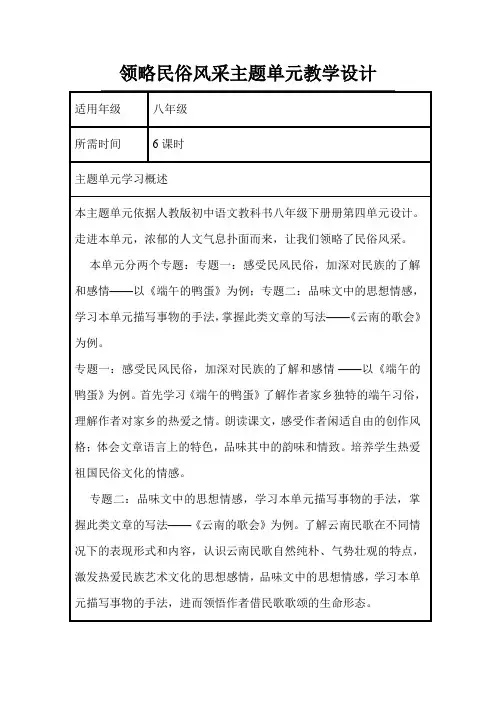
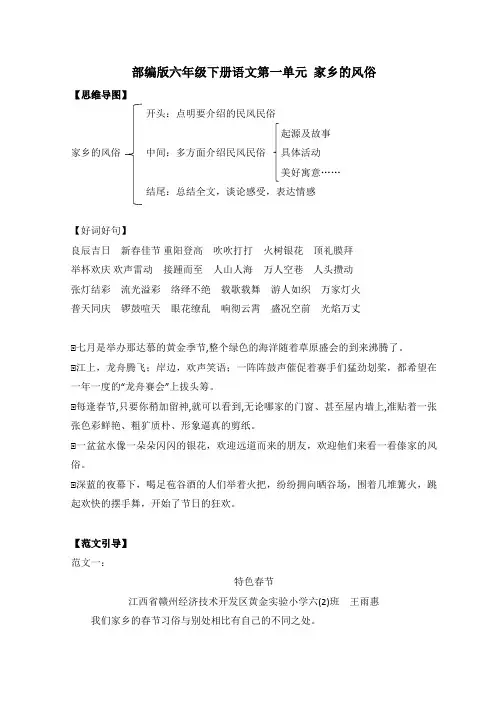
部编版六年级下册语文第一单元家乡的风俗【思维导图】开头:点明要介绍的民风民俗起源及故事家乡的风俗中间:多方面介绍民风民俗具体活动美好寓意……结尾:总结全文,谈论感受,表达情感【好词好句】良辰吉日新春佳节重阳登高吹吹打打火树银花顶礼膜拜举杯欢庆欢声雷动接踵而至人山人海万人空巷人头攒动张灯结彩流光溢彩络绎不绝载歌载舞游人如织万家灯火普天同庆锣鼓喧天眼花缭乱响彻云霄盛况空前光焰万丈☆七月是举办那达慕的黄金季节,整个绿色的海洋随着草原盛会的到来沸腾了。
☆江上,龙舟腾飞;岸边,欢声笑语;一阵阵鼓声催促着赛手们猛劲划桨,都希望在一年一度的“龙舟赛会”上拔头筹。
☆每逢春节,只要你稍加留神,就可以看到,无论哪家的门窗、甚至屋内墙上,准贴着一张张色彩鲜艳、粗犷质朴、形象逼真的剪纸。
☆一盆盆水像一朵朵闪闪的银花,欢迎远道而来的朋友,欢迎他们来看一看傣家的风俗。
☆深蓝的夜幕下,喝足苞谷酒的人们举着火把,纷纷拥向晒谷场,围着几堆篝火,跳起欢快的摆手舞,开始了节日的狂欢。
【范文引导】范文一:特色春节江西省赣州经济技术开发区黄金实验小学六(2)班王雨惠我们家乡的春节习俗与别处相比有自己的不同之处。
发财菜大年初一,很多地方都是大鱼大肉,我们这就不同了。
大年初一早上六点,村里每个人必须到村里辈分最大的祖爷爷家的院子里吃素面条和“发财菜”。
所谓“发财菜”其实就是木耳,这还不能买,必须由村里人在枯枝断木上亲自摘来。
据说很久以前,一个大年初一,村里来了一个乞丐。
村里人认为,大年初一把自己的东西给了别人,财气和好运就都给别人了。
于是直到中午,这个乞丐也没有讨到任何东西。
就在他失望地准备离开时,一位家境贫寒的孕妇大方地给了他一碗素木耳面条。
乞丐吃下素面感激地说:“你不嫌弃我是一个乞丐,把自己家的早饭给我吃,相当于一年的财运都给了我。
我要把好运还给你,你肚子里的小孩长大以后必定成状元。
”说完,乞丐一下子就不见了。
原来,乞丐是一个神仙。
后来,这户人家慢慢地富裕起来,小孩长大以后果真中了状元。
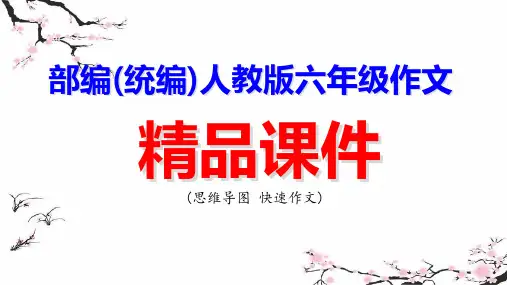



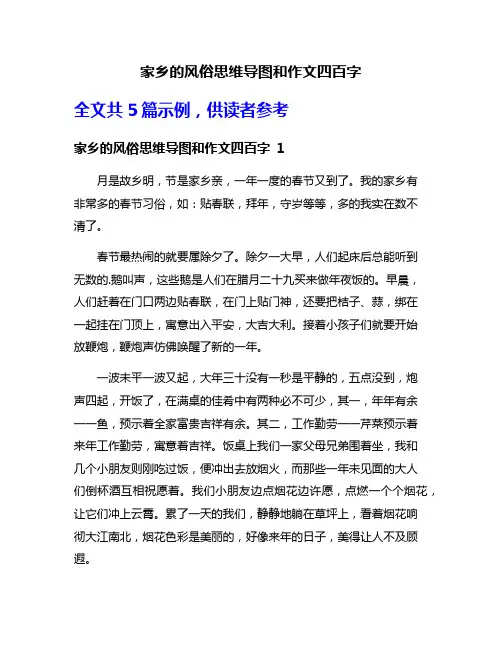
家乡的风俗思维导图和作文四百字全文共5篇示例,供读者参考家乡的风俗思维导图和作文四百字1月是故乡明,节是家乡亲,一年一度的春节又到了。
我的家乡有非常多的春节习俗,如:贴春联,拜年,守岁等等,多的我实在数不清了。
春节最热闹的就要属除夕了。
除夕一大早,人们起床后总能听到无数的.鹅叫声,这些鹅是人们在腊月二十九买来做年夜饭的。
早晨,人们赶着在门口两边贴春联,在门上贴门神,还要把桔子、蒜,绑在一起挂在门顶上,寓意出入平安,大吉大利。
接着小孩子们就要开始放鞭炮,鞭炮声仿佛唤醒了新的一年。
一波未平一波又起,大年三十没有一秒是平静的,五点没到,炮声四起,开饭了,在满桌的佳肴中有两种必不可少,其一,年年有余一一鱼,预示着全家富贵吉祥有余。
其二,工作勤劳一一芹菜预示着来年工作勤劳,寓意着吉祥。
饭桌上我们一家父母兄弟围着坐,我和几个小朋友则刚吃过饭,便冲出去放烟火,而那些一年未见面的大人们倒杯酒互相祝愿着。
我们小朋友边点烟花边许愿,点燃一个个烟花,让它们冲上云霄。
累了一天的我们,静静地躺在草坪上,看着烟花响彻大江南北,烟花色彩是美丽的,好像来年的日子,美得让人不及顾遐。
饭后家家户户又是放鞭炮,震耳欲聋的鞭炮声响成了连绵的一片,这一刻过年的气氛也就更浓了。
在家乡,春节是我们最欢乐的节日,腊月三十的年夜饭,正月的拜年等,都像一个个美妙的音符,永远刻画在我的心里。
家乡的风俗思维导图和作文四百字2在我的家乡有许许多多的传统节日,比如:春节、端午节、重阳节…每个节日都有传统的风俗习惯。
春节的脚步声离我们越来越近了,而在春节里,我们的习俗就可以装上一箩筐。
年三十的晚上,亲朋好友都会回家,大家团聚在一起,吃着美味的食物并且互相聊天。
吃完晚饭,我们小孩便可以拿着炮仗到外面尽情的玩,而大人们则是在房间里打牌,看电视。
直到很晚,我们才上床腄觉。
年初一早上,我早早的便起了床,喝了一碗香浓甜美的枣子汤,暖暖身子,喝完枣子汤后,那震耳欲聋的鞭炮声回响在耳边,新的一年就在这爆竹声中开始了,这种场面使我想起了王安石的元日。
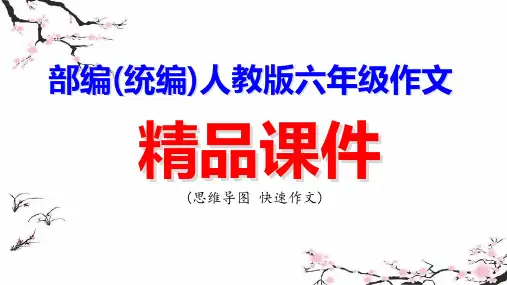
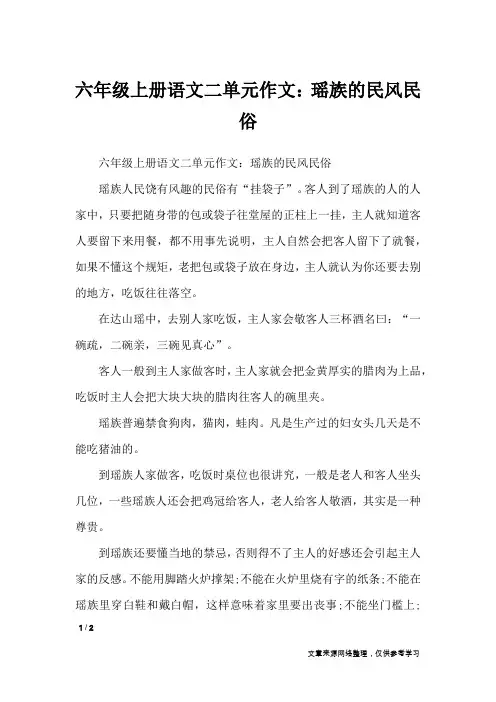
六年级上册语文二单元作文:瑶族的民风民
俗
六年级上册语文二单元作文:瑶族的民风民俗
瑶族人民饶有风趣的民俗有“挂袋子”。
客人到了瑶族的人的人家中,只要把随身带的包或袋子往堂屋的正柱上一挂,主人就知道客人要留下来用餐,都不用事先说明,主人自然会把客人留下了就餐,如果不懂这个规矩,老把包或袋子放在身边,主人就认为你还要去别的地方,吃饭往往落空。
在达山瑶中,去别人家吃饭,主人家会敬客人三杯酒名曰:“一碗疏,二碗亲,三碗见真心”。
客人一般到主人家做客时,主人家就会把金黄厚实的腊肉为上品,吃饭时主人会把大块大块的腊肉往客人的碗里夹。
瑶族普遍禁食狗肉,猫肉,蛙肉。
凡是生产过的妇女头几天是不能吃猪油的。
到瑶族人家做客,吃饭时桌位也很讲究,一般是老人和客人坐头几位,一些瑶族人还会把鸡冠给客人,老人给客人敬酒,其实是一种尊贵。
到瑶族还要懂当地的禁忌,否则得不了主人的好感还会引起主人家的反感。
不能用脚踏火炉撑架;不能在火炉里烧有字的纸条;不能在瑶族里穿白鞋和戴白帽,这样意味着家里要出丧事;不能坐门槛上;
1 / 2
不能坐主妇烧火坐的凳子椅子;遇人伐木时不能说“吃肉”“死”等词象征着不吉利;穿草鞋不能上楼。
瑶族不生产盐,但同时又不能缺少盐。
盐在瑶族是请最公道,至亲的人主持的,这叫做“盐信”,凡是接到“盐信”者无论多么重要的事都会丢下,按时赴约。
瑶族人的民风民俗还有很多,大家可以走一走,看一看,瑶族人天性好客会热情接待你的。
2 / 2。

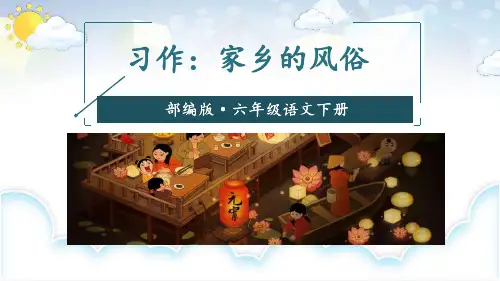
作文家长的风俗思维导图English Answer:Parents' Folkloric Mindset.Core Beliefs:Emphasis on tradition and conformity: Parentsprioritize maintaining cultural values and expectations, adhering to traditional practices and norms.Familial honor and reputation: They believe that their children's actions reflect on the family's reputation and bring either honor or shame to the family name.Parental authority and respect: Parents expect utmost respect and obedience from their children, consideringfilial piety as a fundamental virtue.Educational achievement and career success: Theystrongly value their children's education and career success, viewing them as essential for the family's social status and financial well-being.Interdependence and collectivism: Parents emphasize the importance of family unity and cooperation, expecting their children to contribute to the family's goals andwell-being.Parenting Practices:Authoritarian parenting: Parents maintain strict control over their children's behavior, using punishment or the threat of punishment to enforce discipline.Emotional restraint: Parents often suppress their own emotions and expect their children to do the same, emphasizing stoicism and emotional control.Limited autonomy: Children are given limited choices and independence, expected to defer to their parents' decisions and follow established patterns.Conditional love: Parents' love is often conditional, based on their children's adherence to family values and expectations.Priority of duty over individual desire: Children are expected to prioritize family obligations and responsibilities over their own personal desires.Impact on Children:Positive outcomes: Children raised in this folkloric mindset may develop a strong sense of family loyalty, respect for tradition, and a commitment to educational and career success.Negative outcomes: Children may experience emotional suppression, limited self-expression, and a lack of autonomy, which can hinder their psychological well-being and development.Cultural disconnect: As children become more exposedto contemporary Western values, they may experience tension between their parents' folkloric mindset and their own more individualistic and autonomous tendencies.Evolution and Challenges:Changing family dynamics: Modernization and urbanization have led to shifts in family structures and dynamics, challenging traditional folkloric parenting practices.Western influence: Globalization and increased exposure to Western cultures have introduced alternative parenting styles and values, influencing some parents to adopt more flexible and child-centered approaches.Education and awareness: Parents are becoming more aware of the potential benefits and limitations offolkloric parenting, and some are seeking alternative ways to raise their children while still instilling cultural values.Chinese Answer:家长的风俗思维导图。
部编版语文六年级下册同步作文详解之写作指导、思维导图和病文升格第一单元家乡的风俗习作要求“离家三里远,别是一乡风。
”我们的祖国幅员辽阔,民族众多,每个地方都有自己的风俗习惯。
你的家乡有哪些风俗习惯?请你介绍一种风俗,或写一写你参加一次风俗活动的经历。
如果是介绍一种风俗,写之前,先查阅资料或问问长辈,深入了解这种风俗,想一想这种风俗的主要特点是什么,可以分几个方面介绍,重点介绍什么。
在介绍的时候,可以适当写写自己对这种风俗的实际体验。
如果是写自己参加风俗活动的亲身经历,则可以把这种风俗的特点或来历自然地穿插在合适的地方,如,“听爸爸说,这个习俗大有来历呢……”或“我查资料得知,元宵象征着……”,然后重点描写活动现场的情况和自身的感受。
如果你对这种风俗习惯有自己的看法,也可以表达出来。
写好以后和同学分享,根据同学的意见进行修改、完善。
如果有条件,可以将全班同学的习作集中在一起,编成一本民俗作品集。
审题指导本次习作要抓住两个关键词:“家乡”和“风俗”。
“家乡”限定写作的地域,意味着不能写“他乡”;当然,“家乡”不一定只指自己所住的村子、街道,也可以理解为自己所在的镇、县、市等。
描写的对象是“风俗”,可以是介入风俗或节气风俗,可以是婚丧嫁娶等人生礼仪习俗,也可以是具有地方特色或民族风情的饮食、民居、服饰、舞蹈,等等。
但要注意限定语“家乡”,不能写成别的地方的风俗。
拟题思路本次习作是介绍家乡的风俗,属于介绍说明性质,拟题时可以用与这个风俗有关的物品为题,如《春联》《家乡的粽子》《家乡的春节风俗》《家乡的端午节风俗》等;可以用风俗活动的名称为题,如《赏花灯》《逛庙会》等;也可以表达自己的情感,如《我喜欢的元宵节风俗》《元宵节观花灯真有趣》《快乐的泼水节》等。
写作思路1.通过不同途径了解风俗。
每个地方都有各自的风俗,每一种风俗都有着丰富的文化内涵。
我们可以通过亲身体验,比如研学、旅游、考察、实地走访,或者通过上网查阅资料,查阅相关书籍,向长辈访问等方式来了解民俗。
关于许昌的民俗民风作文许昌,这座位于中原大地的城市,就像一本厚重又鲜活的历史书,每一页都写满了独特而迷人的民俗民风。
说起许昌的民俗,那首先得聊聊这儿热闹非凡的庙会。
每年的特定日子,各个乡镇的庙会就像是一场盛大的派对。
我还记得去年去禹州的一个庙会,那场面,真是人山人海。
远远望去,一排排红色的帐篷就像一条蜿蜒的巨龙,绵延不绝。
走进一瞧,各种摊位琳琅满目,有卖糖葫芦的,那一串串红彤彤的糖葫芦在阳光下闪着诱人的光泽,糖浆裹得厚厚的,咬一口,嘎嘣脆,酸甜的味道瞬间在嘴里散开。
还有卖玩具的,花花绿绿的玩具摆满了一地,小孩子们围在那里,眼睛直勾勾地盯着,拉着大人的衣角不肯走。
庙会上还有各种表演,耍杂技的、唱大戏的,让人目不暇接。
耍杂技的师傅们技艺高超,有的在空中翻腾,有的在高高的杆子上做出惊险的动作,引得观众们阵阵惊呼。
唱大戏的舞台前更是挤满了人,演员们穿着华丽的戏服,脸上画着精致的妆容,一颦一笑,一腔一调,都韵味十足。
我虽然听不懂戏词,但光看那架势,就觉得特别有意思。
除了庙会,许昌的婚俗也很有讲究。
我曾经参加过一场许昌本地的婚礼,那场面真是既热闹又温馨。
婚礼的前一天,男方家里就开始忙碌起来,张灯结彩,布置新房。
大红的喜字贴满了门窗,床上铺满了红枣、花生、桂圆、莲子,寓意着早生贵子。
婚礼当天,新娘早早地起来梳妆打扮,穿上漂亮的婚纱,等待着新郎的到来。
新郎带着迎亲的队伍,一路上吹吹打打,好不热闹。
到了新娘家,还有一番热闹的“刁难”,伴娘们会想出各种有趣的小游戏来考验新郎,比如让新郎找新娘的鞋子,或者回答一些关于新娘的问题。
好不容易接到了新娘,回到新郎家,还有拜天地、敬茶等一系列仪式。
整个婚礼过程中,大家的脸上都洋溢着幸福的笑容,那种喜悦的氛围能感染每一个人。
许昌人在饮食方面也有着独特的风俗。
就拿过年来说吧,家家户户都会蒸馒头、炸丸子。
蒸馒头可是个技术活,得把面发得恰到好处,揉得筋道有力。
馒头的形状也是多种多样,有圆形的、方形的,还有各种小动物形状的,特别可爱。
家长的风俗作文指导思维导图英文回答:As a parent, customs play a significant role in shaping the values and behaviors of my family. Customs are the traditions and practices that are passed down from generation to generation, and they provide a sense of identity and belonging. They serve as a guide for our actions and help us navigate through life. In this essay, I will discuss the importance of customs as a parent and how they influence my parenting style.Firstly, customs help to instill discipline and respect in children. For example, in my family, we have a custom of bowing to our elders as a sign of respect. This custom teaches my children the importance of showing respect to others, especially to those who are older or in a position of authority. It also helps them understand the value of humility and the importance of acknowledging the wisdom and experience of others.Secondly, customs provide a sense of continuity and stability for children. For instance, in my family, we have a custom of having dinner together every night. This tradition allows us to connect as a family, share our daily experiences, and bond with one another. It creates a sense of belonging and security for my children, knowing that they can rely on this daily ritual to bring us together as a family.Furthermore, customs help to transmit cultural values and heritage to children. For example, in my family, we celebrate Chinese New Year every year. This custom allows my children to learn about their Chinese heritage, understand the significance of the festival, and appreciate the customs and rituals associated with it. It helps them develop a sense of pride in their cultural background and fosters a connection to their roots.In addition, customs can also serve as a way to teach important life lessons and values. For instance, in my family, we have a custom of giving back to the community byvolunteering at a local charity every month. This custom teaches my children the importance of compassion, empathy, and the value of helping others. It helps them develop a sense of social responsibility and cultivates a spirit of giving.Overall, as a parent, customs are an integral part of my family's life. They provide a framework for our actions, instill discipline and respect, create a sense ofcontinuity and stability, transmit cultural values, and teach important life lessons. They shape the values and behaviors of my children and help them develop into responsible and well-rounded individuals.中文回答:作为一个家长,风俗在塑造我家庭的价值观和行为方面起着重要作用。